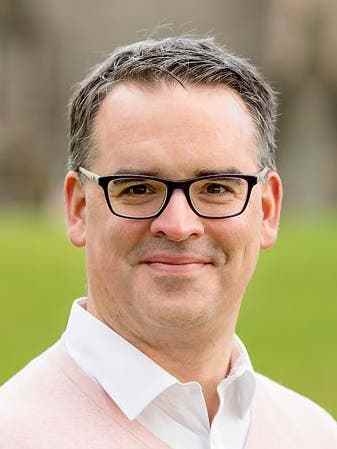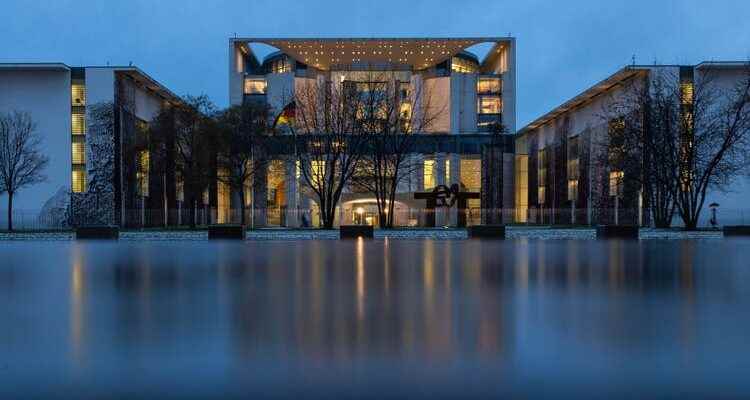The Federal Republic prides itself on having drawn the right conclusions from the past. However, their representatives, Scholz and Steinmeier, fail to recognize that other states have reached different conclusions.
The power of the government is architecturally concentrated in the Federal Chancellery. Now it is to be expanded and at the same time set a sign “that we find fascism and Hitlerism terrible” – says Olaf Scholz.
Mr. Weber, the expansion of the Federal Chancellery has been criticized because of the high costs – over 750 million euros are estimated. The head of the house, Chancellor Olaf Scholz, also defended the construction work by pointing out that a democratic counterpart to “Hitler’s planned megalomaniac fascist boulevard” was being created here as a “bond of the federation”. Is this a successful or a misguided culture of remembrance?

Thomas Weber teaches history in Aberdeen, Scotland.
In my opinion, this is a very twisted, even confused historical policy. Is it supposed to be a sign of democracy that the Nazis’ unrealized plans should be implemented under new auspices?
In the volume you edited, “When Democracy Died”, you lament the German tendency “to draw narrow and erroneous lessons from the past”. The gigantic Chancellery apparently falls into this category.
The justifications for the chancellery and the “bond of the federation” are more awkward than tragic. But this case also shows how easily historical politics can be exploited for contemporary purposes.
What false lessons did German politics learn from National Socialism and the failure of the Weimar Republic? drawn democracy?
Comparative research shows that a large number of small parties need not prepare the ground for authoritarianism. Fragmentation is not necessarily a problem. Democracy remained stable in the Netherlands, although in the interwar period there was almost the same electoral law as in the Weimar Republic, with 10 to 17 parties in parliament. Nevertheless, the five percent hurdle was introduced in Germany after 1945 to protect democracy from an authoritarian drift.
Were there such historical fallacies in 1990, after the fall of the Iron Curtain?
Without realizing it itself, Germany acted uncomfortably overpowering and taught other European countries lessons in dealing with the past.
In which fields did this happen?
As far as relations with Russia are concerned, Germany tended one-sidedly to the tale of neighbors ready for peace and of the dwindling importance of the military. Eastern European countries had and have a different view, not least because of the Soviet occupation of their territory. Many Germans did not realize that their European neighbors often learned different lessons from the National Socialist past when it came to preserving peace in the 21st century.
I can’t remember that in the 1990s there were any serious calls to abolish the Bundeswehr.
Not that, but in Ostpolitik people clung to the illusion that it would work entirely without hard power, solely through understanding and the creation of mutual dependencies. Such wrong conclusions from the German past did not contribute to sovereignty.
You call National Socialism an illiberal democracy. Isn’t that a trivialization?
no National Socialism was a dictatorship, there is no mistaking that. However, I am concerned with the question of why he was still able to appear attractive. Only when we approach this question does it become apparent how quickly democratic societies can switch to unfree ones. It’s no use labeling every politician we don’t like a fascist off the top of your head. That says nothing. We have to take a closer look and understand why National Socialism initially appeared to many people as a democratic promise.
You write that National Socialism promised freedom and equality. These are two key categories to which today’s Federal Republic has nothing to object.
There is indeed a convergence but no identity of promises: freedom, equality, self-determination. Of course, these three principles have diametrically different consequences in a liberal and in an illiberal society. Political systems can collapse at any time. It always depends on how the actors see themselves.
Which kind of self-determination do you mean as a tempting promise of liberal and illiberal democracy: the self-determination of the nation or that of the individual?
I mean both forms, but in a different balance. The balance between the individual and the community is always the central criterion for the political identity of a society. We see it in the extreme individualism of Ayn Rand or Donald Trump – who for that reason alone cannot be a fascist – as in the collectivist ideologies of National Socialism or Communism or in the liberal societies of the West.
The German Federal President is convinced that liberal democracies are stronger than illiberal ones because they “can preserve freedom and diversity in the problem-solving process”. Dictatorships lack this “possibility for self-correction”. Is Frank-Walter Steinmeier right?
I’m hesitant to answer, leaning towards a yes, but. Yes, this capacity for self-correction is what makes strong liberal democracies, and it is what is grossly underestimated in the United States. The US always manages to do things wrong before doing them right.
Then why were you hesitating?
There is a new type of authoritarian state that is also consciously trying to learn from its mistakes. China has fallen into this category in recent years. It is not only the rigid handling of the Covid pandemic that raises doubts. In addition, the ability of Western democracies to correct themselves is not automatic. In concrete terms, I currently have doubts about Germany’s willingness to correct itself. One conjures up one’s culture of remembrance like a mantra, but only very selectively draws conclusions from it.
Isn’t the “turn of the era” promised by Olaf Scholz a very practical consequence of the new world situation?
The realpolitik “turning point” is not primarily that the world has suddenly changed, but that February 24, 2022 opened the eyes of many Germans to insights that Germany’s neighbors had been aware of for a long time. In the case of former Federal Foreign Minister Steinmeier in particular, I am still waiting for him to face up to his own mistakes of the past not only theoretically but also practically and for the party from which he comes to undertake a real self-correction. Even reading the story with the best of intentions doesn’t automatically lead to the right conclusions.
There are also political leaders who turn to history with less good intentions and use it to legitimize their respective world views.
Vladimir Putin and Adolf Hitler both think historically. Dealing with history does not necessarily lead to the right action. This also applies to the politics of remembrance in the present. Well meant is not well done.
The considerations of the “Ampel” on easier naturalization in Germany and on dual citizenship are likely to be well intentioned. But is it realistic to commit immigrant Syrians, Iraqis or Afghans to the German culture of remembrance? To quote the Federal President one last time: The “Never again!” remains, according to Steinmeier, “our common foundation, for those who were born here and those who come to it”.
Why shouldn’t that work? I am also a “permanent resident of Canada” through my marriage to my Canadian wife. After fulfilling very strict rules, I was welcomed with open arms – and with the constant expectation to engage with certain Canadian values and the Canadian way of dealing with the past, such as the history of the indigenous people. No one is bothered by the fact that the children sing the Canadian national anthem at school every morning. A Syrian who becomes part of a new community should also become part of a new community of responsibility. He could then be filled with pride when looking at buildings of the past as well as shame when looking at past crimes.
So what are the challenges facing German politics of remembrance?
Germans should overcome their myopic view of the past and accept that other countries draw different normative conclusions from the past. The Prime Minister of the Netherlands, for example, who studied history, Mark Rutte, called the war in Ukraine “our war, too.” He knows about the traumatic occupation of his homeland by the Germans. In Germany, on the other hand, the conviction prevailed for a long time that National Socialism resulted in a duty not to interfere. Germans should recognize that they do not have a monopoly on the normative interpretation of the past.
Explainer of the upheavals
kisses Thomas Weber comes from Hagen in North Rhine-Westphalia and has been a professor of history and international politics at the University of Aberdeen since 2013. He is also a Visiting Fellow at the Hoover Institution at Stanford University. His book How Adolf Hitler Became a Nazi, published in 2016, made him known to a larger audience. He has just submitted the anthology “When Democracy Died: The National Socialists’ Seizure of Power – History and Present” to Herder as editor and author. He is currently working on several projects on political radicalization in times of upheaval and crisis and on the peace process in Bosnia.
